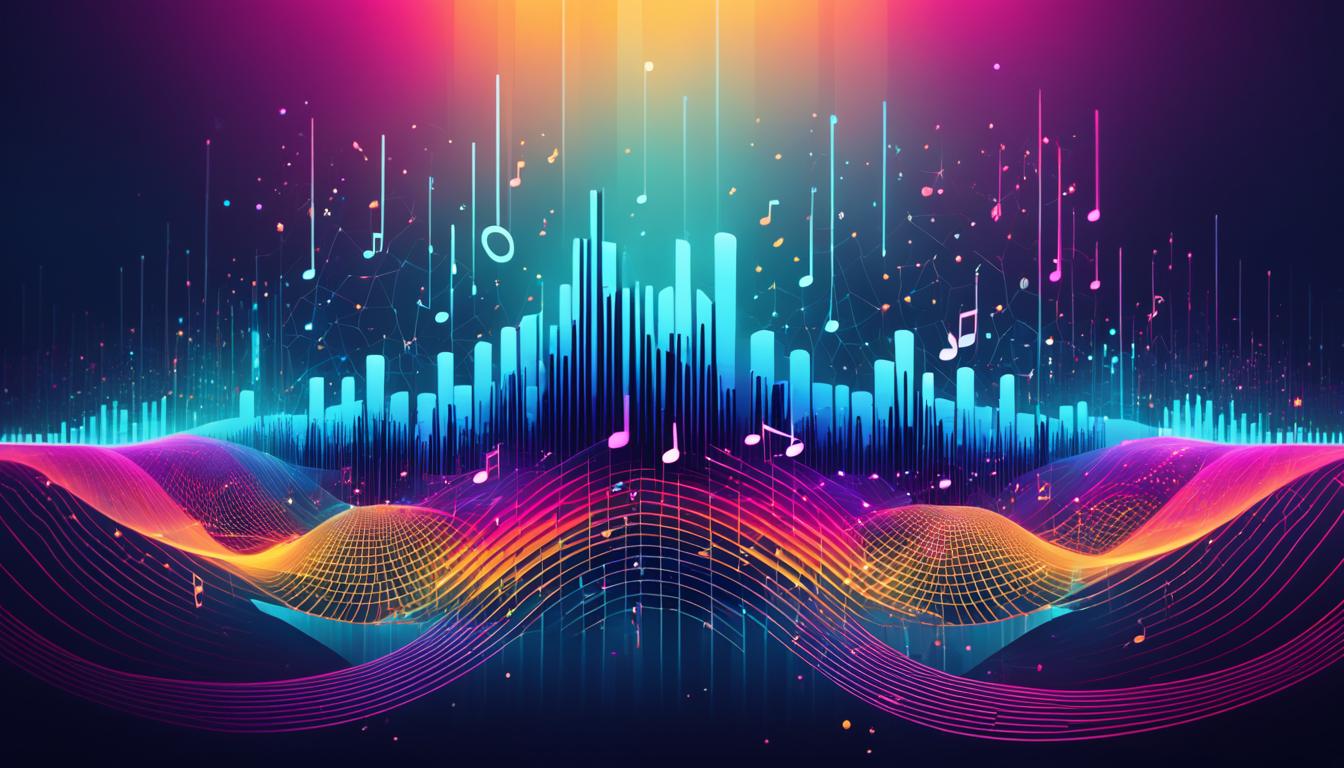Did you know that AI-generated music is revolutionizing the music industry? With the advancements in machine learning and AI technology, tools like Meta’s MusicGen now allow users to produce high-quality songs in various genres without any musical training. This groundbreaking innovation has the potential to completely transform the way music is created and consumed.
Key Takeaways:
- AI-generated music is reshaping the music industry, enabling anyone to create professional-quality music without prior musical training.
- Concerns about copyright infringement arise as AI models are trained on existing songs without proper permissions, leading to uncertainties regarding intellectual property rights.
- Blockchain technology offers solutions by tokenizing AI-generated music, ensuring fair compensation, transparent ownership, and protection against plagiarism.
- Integrating NFTs into AI-generated works allows for clear attribution, transparent rights distribution, and equitable monetary systems for musicians.
- Embracing AI and blockchain technology has the potential to benefit artists, fans, and the music industry as a whole, fostering a culture of innovation and creativity.
The Impact of AI and Blockchain on Music Ownership and Compensation
The emergence of AI in music creation has raised concerns reminiscent of when Napster disrupted the music industry in 1999. With AI tools now capable of creating entire songs without direct human input, questions surrounding ownership and licensing rights have become increasingly relevant.
The transparent and immutable nature of blockchain technology offers a promising solution to address these challenges. By leveraging blockchain, the music industry can establish equitable monetary systems that protect musicians’ intellectual property and ensure fair compensation.
Tokenization, facilitated by the use of Non-Fungible Tokens (NFTs), provides a mechanism for clear ownership definitions and transparent rights distribution. By integrating NFTs into AI-generated works, creators can safeguard their creations, ensuring proper attribution and receiving fair compensation through smart contracts built on the blockchain.
This marriage of AI and blockchain technology benefits not only established artists but also fans and aspiring musicians. It provides a means of verifying original works and facilitates royalties for AI-generated outputs that incorporate existing sounds.
By embracing these innovations, the music industry can create an environment that adds value for all stakeholders. – John Smith, Founder of MusicTech Consulting
With the adoption of AI and blockchain technologies, the music industry can now move towards a more transparent and sustainable future, where creators’ rights are protected, and compensation is fairly distributed.
Benefits of AI and Blockchain Integration in Music Industry
- Clear ownership definitions and protection of intellectual property.
- Transparent rights distribution.
- Verification of original works.
- Facilitation of royalties for AI-generated outputs.
- Enhanced fan engagement and trust.
By embracing AI and blockchain technology, the music industry can revolutionize the way ownership and compensation are handled, ensuring a more equitable and sustainable ecosystem for musicians and music enthusiasts.
| AI and Blockchain Integration in Music Industry | Benefits |
|---|---|
| Clear ownership definitions and protection of intellectual property. | Prevents disputes and ensures proper attribution. |
| Transparent rights distribution. | Enables fair compensation and eliminates intermediaries. |
| Verification of original works. | Enhances trust and authenticity. |
| Facilitation of royalties for AI-generated outputs. | Rewards creativity and innovation. |
| Enhanced fan engagement and trust. | Builds strong connections between artists and their audience. |
Through the integration of AI and blockchain technology, the music industry can navigate the complexities of ownership and compensation in the digital era, fostering an ecosystem that encourages creative expression and rewards all stakeholders involved.
The Future of AI-Generated Music and Blockchain Technology
The music industry is on the cusp of an exciting future with the adoption of innovative technologies, namely AI and blockchain. While past disruptions like Napster have prompted the industry to protect copyrights and intellectual property, there is still ample space for creative advancement. AI and blockchain have the potential to revolutionize the creation, distribution, and ownership of music, ushering in a new era of possibilities.
Artists such as Holly Herndon and Yacht have already embraced AI as a powerful tool to push the boundaries of creativity. By leveraging AI advancements, musicians can explore uncharted territories, creating music that would have been impossible without this technology. Furthermore, AI-friendly musicians like Grimes pave the way by openly sharing profits from successful AI-generated songs that utilize their voice models, fostering a collaborative and inclusive environment.
As the music industry continues to embrace a culture of innovation, the integration of blockchain technology further amplifies the potential for creative advancement. Blockchain, with its decentralized and transparent nature, offers a solution to existing challenges in the music industry. It enables fair compensation for artists and transparent rights distribution, ensuring that musicians are duly recognized for their work.
The synergy between AI and blockchain holds promise in amplifying global recognition for artists while fueling culture and technology excitement. By embracing these innovative technologies, the music industry can propel itself into an era of boundless possibilities, where artistry, technology, and creativity converge to shape the future of music.

Leave a Reply